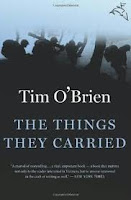Tim O'Brien, The Things They Carried
10. I finished reading this book in June, I taught it to my students over the summer and I am about to teach it again. So, I thought this was an appropriate time to post about the book.
9. I don't like war books or war movies all that much; however, I love this book. O'Brien would tease me for saying that, just like he does the fictional (?) woman that comes up to him at readings at the end of "How to Tell A True War Story." It is about war, but really it teaches you about the tenuous and yet co-dependent relationship between truth and fiction. It is also a magnificent piece of metafiction.
8. How to Tell A True War Story is a masterpiece. So is "Sweetheart of the Song Tra Bong," although in a completely different way.
7. To summarize the "plot": Tim O'Brien, the narrator, not necessarily the author, is drafted and goes to Vietnam. He thinks about running to Canada. His friends die. He remains obsessed with telling stories about the war for the rest of his life.
6. That plot summary does absolutely no justice to the content of this book.
5. At the conclusion of "How to Tell A True War Story, O'Brien states: "In the end, of course, a true war story is never about war. It’s about the special way that dawn spreads out on a river when you know you must cross the river and march into the mountains and do things you are afraid to do. It’s about love and memory. It’s about sorrow. It’s about sisters who never write back and people who never listen." This quote, along with so many others challenges the notion that stories about "about" one thing. It supports the notion that the heart of the story, or the meaning, may not be related to the content...duh. It also challenges the notion that there is a single perspective on one event, a single meaning in any story. Of course, this is very postmodern, but not at all pretentious. This book has so many moments like this one.
4. This is why this book is a pleasure to teach.
3. The book is a collection of short stories, but it also works as a novel.
2. In his essay on "Good Readers and Good Writers" Vladimir Nabokov suggests that to confuse truth and fiction is to do a disservice to both truth and fiction. O'Brien suggests that there is no real dichotomy there. Truth and fiction are too intertwined to separate. Of course, O'Brien did go to Vietnam, so the book plays with the reader, teasing her to ask whether or not these are "true stories." The text laughs back, but there is truth in the book, in some sense.
1. Read it.
9. I don't like war books or war movies all that much; however, I love this book. O'Brien would tease me for saying that, just like he does the fictional (?) woman that comes up to him at readings at the end of "How to Tell A True War Story." It is about war, but really it teaches you about the tenuous and yet co-dependent relationship between truth and fiction. It is also a magnificent piece of metafiction.
8. How to Tell A True War Story is a masterpiece. So is "Sweetheart of the Song Tra Bong," although in a completely different way.
7. To summarize the "plot": Tim O'Brien, the narrator, not necessarily the author, is drafted and goes to Vietnam. He thinks about running to Canada. His friends die. He remains obsessed with telling stories about the war for the rest of his life.
6. That plot summary does absolutely no justice to the content of this book.
5. At the conclusion of "How to Tell A True War Story, O'Brien states: "In the end, of course, a true war story is never about war. It’s about the special way that dawn spreads out on a river when you know you must cross the river and march into the mountains and do things you are afraid to do. It’s about love and memory. It’s about sorrow. It’s about sisters who never write back and people who never listen." This quote, along with so many others challenges the notion that stories about "about" one thing. It supports the notion that the heart of the story, or the meaning, may not be related to the content...duh. It also challenges the notion that there is a single perspective on one event, a single meaning in any story. Of course, this is very postmodern, but not at all pretentious. This book has so many moments like this one.
4. This is why this book is a pleasure to teach.
3. The book is a collection of short stories, but it also works as a novel.
2. In his essay on "Good Readers and Good Writers" Vladimir Nabokov suggests that to confuse truth and fiction is to do a disservice to both truth and fiction. O'Brien suggests that there is no real dichotomy there. Truth and fiction are too intertwined to separate. Of course, O'Brien did go to Vietnam, so the book plays with the reader, teasing her to ask whether or not these are "true stories." The text laughs back, but there is truth in the book, in some sense.
1. Read it.


Comments
Post a Comment
I love your comments. Thanks for making me a happy blogger.